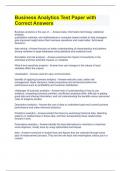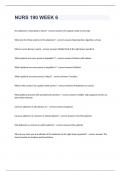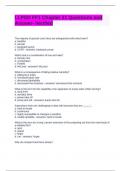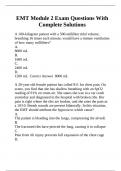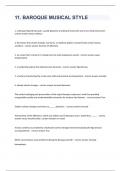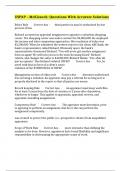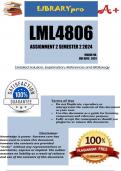UNIT 4
CHAPER 1 : INTRODUCTION TO LABOUR LAW & THE SOURCES OF LABOUR
LAW
• Labour law = part of the law that deals with the tri-partite relationship between the
state, capital (employers) and labour (employees).
• Labour law = an important branch of the law as it regulates the activity of working,
which is a central part of most people’s lives.
o Some people are employees and simultaneously act on behalf of their
employers
Labour law directly impacts on thr daily
• Labour law is influenced by: lives of nearly every person in the
o Social factors country, and indirectly influences the
o Economic factors lives of every person irrespective of
o Financial factors their position or age
o Political factors
• Relationship between employer and employee = based on the employment contract
The 5 fairness mechanisms imposed on the contract to protect employees:
1. Provision for minimum conditions of employment à the Basic Conditions of
Employment Act (BCEA)
2. Provision for collective bargaining in terms of which employees may act together (in
trade unions) in order to bargain from a stronger position for better wages and
employment conditions
3. Protection against unfair dismissal. à The Labour Relations Act (LRA) provides that
the employer may not dismiss the employee merely by giving notice.
• The employer must have a valid reason and must follow a fair procedure
before the dismissal will be regarded as fair.
4. Protection against unfair labour practices à The LRA also provides that the
employer may not act unfairly in respect of aspects of the employment relationship
not concerning dismissal (so-called unfair labour practices)
5. Protection against discrimination. à The Employment Equity Act (EEA) prohibits
unfair discrimination on arbitrary grounds such as race, sec etc. and ensures equal
opportunities for all by making provision for affirmative action.
, In 2018, legislation was enacted to establish a national minimum wage, which is also an
example of a fairness mechansism introduces into the employment relationship through
means of legislation.
à This brings fairness to the employment relationship of individual low-earning and
unskilled employees AND is also aimed at contributing to the achievement of
social justice, more generally
INDIVIDUAL AND COLLECTIVE LABOUR LAW
à Individual labour law deals with rules concerning the “individual relationship between an
employer and an individual employee.
o A contact of employment (for example) is concluded on an individual basis and is
terminated on an individual basis.
à Collective labour law deals with the “collective” relationship between collective entities
o An employer and a trade union (which acts on behalf of a number of employees),
or,
o Between one or more employers and one or more unions
o Matters such as collective bargaining, strikes and lockouts form part of collective
labour law.
à The rules of individual and collective labour law often interact and impact on one
another.
LABOUR LAW AND LABOUR RELATIONS
à “Labour relations” refers to the relationship between employers and employees
à “Law law” refers to the legal rules that govern these relationships
CHAPER 1 : INTRODUCTION TO LABOUR LAW & THE SOURCES OF LABOUR
LAW
• Labour law = part of the law that deals with the tri-partite relationship between the
state, capital (employers) and labour (employees).
• Labour law = an important branch of the law as it regulates the activity of working,
which is a central part of most people’s lives.
o Some people are employees and simultaneously act on behalf of their
employers
Labour law directly impacts on thr daily
• Labour law is influenced by: lives of nearly every person in the
o Social factors country, and indirectly influences the
o Economic factors lives of every person irrespective of
o Financial factors their position or age
o Political factors
• Relationship between employer and employee = based on the employment contract
The 5 fairness mechanisms imposed on the contract to protect employees:
1. Provision for minimum conditions of employment à the Basic Conditions of
Employment Act (BCEA)
2. Provision for collective bargaining in terms of which employees may act together (in
trade unions) in order to bargain from a stronger position for better wages and
employment conditions
3. Protection against unfair dismissal. à The Labour Relations Act (LRA) provides that
the employer may not dismiss the employee merely by giving notice.
• The employer must have a valid reason and must follow a fair procedure
before the dismissal will be regarded as fair.
4. Protection against unfair labour practices à The LRA also provides that the
employer may not act unfairly in respect of aspects of the employment relationship
not concerning dismissal (so-called unfair labour practices)
5. Protection against discrimination. à The Employment Equity Act (EEA) prohibits
unfair discrimination on arbitrary grounds such as race, sec etc. and ensures equal
opportunities for all by making provision for affirmative action.
, In 2018, legislation was enacted to establish a national minimum wage, which is also an
example of a fairness mechansism introduces into the employment relationship through
means of legislation.
à This brings fairness to the employment relationship of individual low-earning and
unskilled employees AND is also aimed at contributing to the achievement of
social justice, more generally
INDIVIDUAL AND COLLECTIVE LABOUR LAW
à Individual labour law deals with rules concerning the “individual relationship between an
employer and an individual employee.
o A contact of employment (for example) is concluded on an individual basis and is
terminated on an individual basis.
à Collective labour law deals with the “collective” relationship between collective entities
o An employer and a trade union (which acts on behalf of a number of employees),
or,
o Between one or more employers and one or more unions
o Matters such as collective bargaining, strikes and lockouts form part of collective
labour law.
à The rules of individual and collective labour law often interact and impact on one
another.
LABOUR LAW AND LABOUR RELATIONS
à “Labour relations” refers to the relationship between employers and employees
à “Law law” refers to the legal rules that govern these relationships

